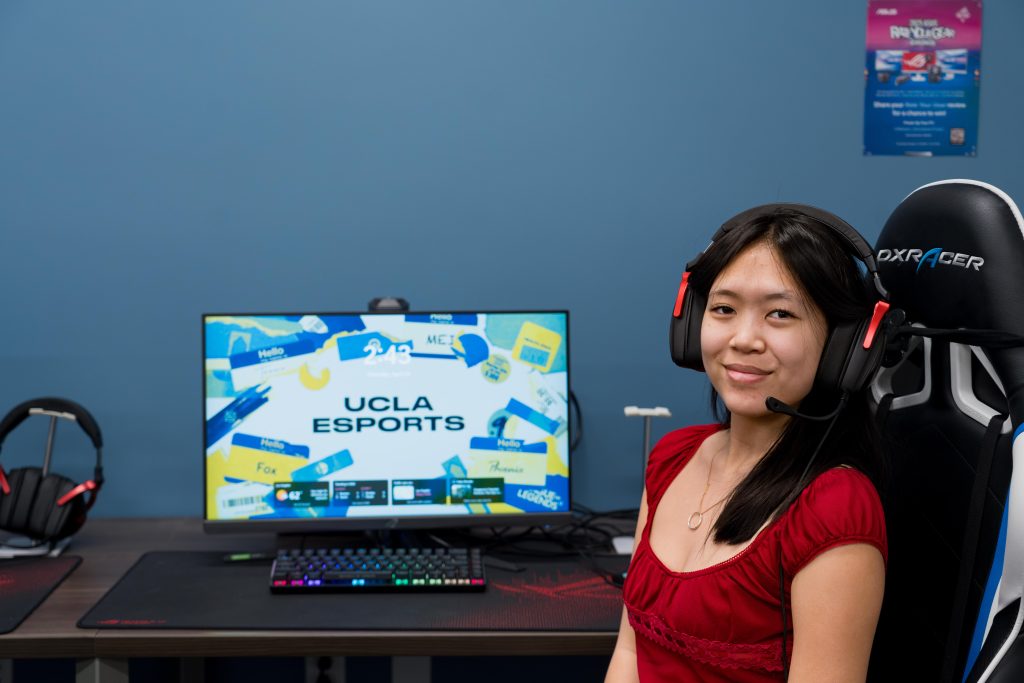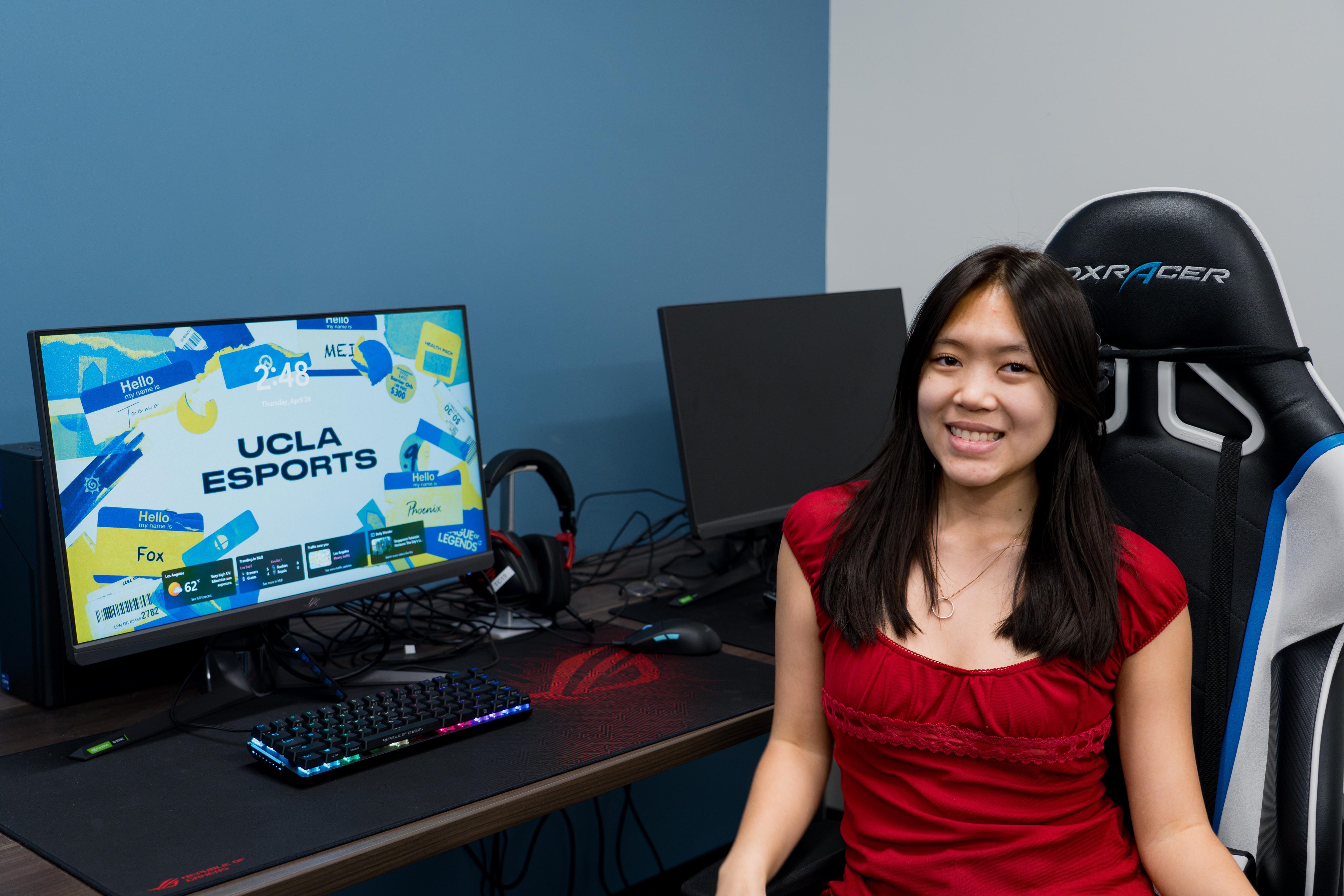There’s been a lot of talk lately about different majors being easier or more difficult than others. Have you ever wondered what it would be like if you were majoring in something else? Or maybe you have just been considering a certain major but wanted to know a little more about it. It can often be hard to know what a major is truly like if you don’t have a one-on-one conversation with someone in it.
Thuyen Tran, a third-year traditional student majoring in economics and minoring in digital humanities , took some time to talk to me about what it is like for her to be an economics student.

The Esports Training Center is where Thuyen Tran and other UCLA Esports marketing interns gather to plan campaigns and video creation. Photographed by Tanisi Venkannagari/BruinLife
Why economics at UCLA?
Tran was initially unsure of what she wanted to do when she chose UCLA, but she took her first economics class, which studied how people act using theory. She is interested in a more creative field such as marketing and currently interns at Warner Bros. Games as a growth and development intern. She chose to minor in digital humanities because of the human behavior aspect. The combination of her major and minor help her with her interest in marketing.
Typical day in the life of an economics student
Tran is currently enrolled in four courses: two economics courses and two courses for her digital humanities minor. For her economics courses, she is taking Economics 137 for urban development and Economics 103 . Throughout the week, she attends her classes, researches and take photos of urban development, and meets with a coding group. Her digital humanities minor allows her to express her creativity. On top of her four classes, she also has an internship that she does for 10 to 20 hours a week.
Tran’s schedule on Tuesday is Economics 103 from 9:30 a.m. to 10:45 a.m . After the class is finished, she takes the bus to Westwood to work from 11 a.m. to 6 p.m. Tran works with a startup called Stacked . On top of that, she is also a board member for a Vietnamese traditional dance team and is the president of a gaming club , along with the other involvements and activities she has going on. Her course lengths are one hour and 15 minutes for each economic course, 50 minutes for computer mediation three times a week and a three-hour class for film.
Balancing coursework, study time and extracurriculars
This is Tran’s first time taking four classes, as the economics major is pretty short. Her digital humanities classes are not as much work compared to the economics courses, which are more dense. During Tran’s first two years, she put pressure on herself to be perfect with her grades, but there is less pressure for her to be perfect now that she is not considering graduate school. Her internship and experiences at Warner Bros. allow her to have fun while keeping up with everything. One thing she did to balance all of her activities was having a full calendar to keep track of everything. There are even times when she will stay up late with friends to study and talk.
Time spent in class versus out of class studying
For Economics 103, Tran has back-to-back projects, and her group meets for them almost every day. They meet around six to eight hours per week for each project. Tran says that Economics 103 is a bit hard to study for, and she sometimes pulls all-nighters before midterms. However, reviewing two to three hours a week helps. Her other economics course, though, consists more of reading off the slides and is fairly easy to catch up on, needing about three hours a week outside of class. Her film class doesn’t have much out-of-class work apart from her needing to put in about an hour a week for assignments. Lastly, her computer communications course for her minor requires about 2 1/2 hours outside of class. Attendance is required, but it helps her stay on track.
Course or professor recommendations
Tran states that overall, there are a lot of complaints about the quality of professors in the economics department. However, one of her favorite professors is professor Chris Surro, who teaches Economics 11 . Tran said that it is “one of the hardest” courses, but she did the best in it because Surro is “so thorough and reviewed homework,” as well as had a good class structure. Another professor whom Tran liked is professor Edward McDevitt. According to Tran, his course structure is “consistent across classes, and he is chill.”
Preparing for exams and assignments
Tran said that she is usually okay studying on her own and actually performs better under pressure, so all-nighters are not an issue for her. “I try to make sure I’m on track in the class by the end of each week,” Tran said. Typically, the day of or before the exam, she goes over all her notes from beginning to end and does study problems to see if she can do them perfectly after studying all she can.
Challenges of being an economics student at UCLA
Tran feared being kicked out of the major as she was originally a business economics student, a major which has been known to weed out students and remove them if they fail two classes. She switched to economics because that worry is “less scary,” and she does well in the courses.
Another fear is that she may not be able to find a full-time, secure job after graduating – a fear that is common among many students.
While being afraid of failure and not meeting the standards of being a UCLA student is something she worries about, she uses the fact that she is surrounded by motivated people to drive her and recognizes that she is “on her own path and timeline.”
Benefits of being an economics student at UCLA
Tran states that being an economics student is very valuable because you are able to gain understanding of supply and demand and math and human behavior, which are ideas that are important for her in pursuing marketing.
Day in the life of an economics student in one sentence
“Being an econ major is optimizing your schedule and maximizing your investments into education!” Tran said.
—
Featured Image Photographed by Tanisi Venkannagari/BruinLife

